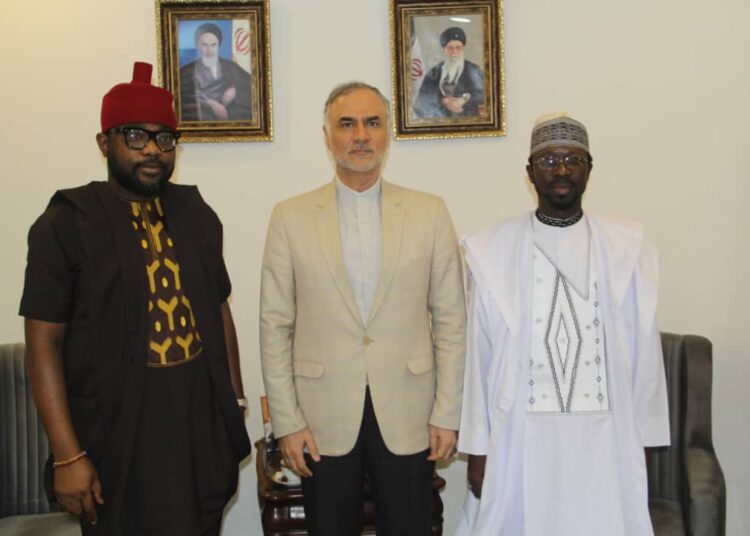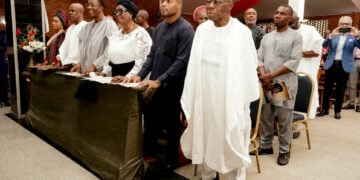The Government of the lslamic Republic of Iran has once again asserted its eagerness to support the Nigerian Government in addressing its energy challenges through collaborative investment and cooperation, primarily, in the development of the oil and gas sector’s downstream division, including refineries and related infrastructure.
This commitment was underscored in Abuja by the Iranian Ambassador to Nigeria and Equatorial Guinea, Ambassador Muhammad Alibak, during a meeting with Honourable Ikenga Imo Ugochinyere, the chairman of the House of Representatives Committee on Petroleum (Downstream).
The meeting took place as part of the legislative committee’s introductory visit to the Iranian Embassy in Abuja.
Accompanied by Honourable Aliyu Mustapha, the Deputy Chairman of the House Committee on Petroleum Resources (Downstream), Honourable Ugochinyere conveyed Iran’s expressed readiness to collaborate on advancing both the downstream and upstream sectors, particularly in the realm of infrastructure development.
This collaboration aims to augment Nigeria’s ongoing gas revolution and petroleum refining endeavours.
Ambassador Muhammad Alibak highlighted the Iranian Government’s unwavering commitment, exemplified through a Memorandum of Understanding (MoU) previously signed by Nigeria’s former Petroleum Minister, Timpre Slyva. He also referenced subsequent correspondence from Iran’s current Oil Minister, demonstrating their determination to collaborate closely with Nigeria.
The Iranian Ambassador expressed Iran’s enthusiasm to bolster Nigeria’s oil and gas sector and explore alternative energy sources, such as Compressed Natural Gas (CNG) projects, refinery improvements, petrochemical ventures, and impactful exploration initiatives.
In response, Hon. Ugochinyere articulated the purpose of their visit to solidify deeper cooperation based on Iran’s long-standing willingness to contribute to Nigeria’s growth and expansion in the downstream sector.
He emphasised the burgeoning opportunities brought about by the recently enacted Petroleum Industry Act (PlA) within the downstream and midstream oil domains.
He sought enhanced investment collaboration with Iran in terms of technology transfer that would fortify the ongoing evolution in the oil and gas sector. Additionally, he underscored the significance of refining alternative energy sources, advancing the CNG Project, accelerating petrochemical initiatives, and boosting profitable exploration endeavours.
Honourable Ugochinyere commended Iran’s successful utilization of gas resources, leading to widespread connectivity to refined gas and enabling economic growth. He commended Iran’s resilience in maintaining local petroleum refining and expanding refining capacity even amidst global economic sanctions.
Comparing Iran’s accomplishments to Nigeria’s petroleum secto, which he criticized for its export-oriented wealth and importation of poverty, he expressed the urgency to transition from exporting crude materials to refining locally.
“This transformation would pave the way for job creation, forex generation, energy security, and greater economic stability,” he stated.
Given the removal of subsidies and the resulting volatility of Nigeria’s oil and gas sector, Hon. Ugochinyere highlighted the potential opportunities presented by the PIA.
He affirmed that closer collaboration with Iran, which successfully overcame challenges including global sanctions, could strengthen Nigeria’s energy security, exploration activities, local refining, and overall industry growth.
The lawmaker assured Ambassador Alibak that the Nigerian Parliament would vigilantly oversee the implementation of the PlA, ensuring its intentions are upheld with unwavering consistency. He encouraged Iranian investors and oil companies to capitalize on the transparent and competitive market environment, leveraging the newfound stability in Nigeria’s oil and gas sector.
As Nigeria’s downstream and midstream sector enters a phase of full deregulation and enhanced regulatory frameworks, Honourable Ugochinyere highlighted the present prime opportunity for foreign investment, particularly in local refining of petroleum products, petrochemical plants, gas infrastructure, and the burgeoning CNG project.
The assurance was extended that Nigeria’s Parliament would remain steadfast in fostering a conducive
Environment for foreign investment and sustainable sector growth.





